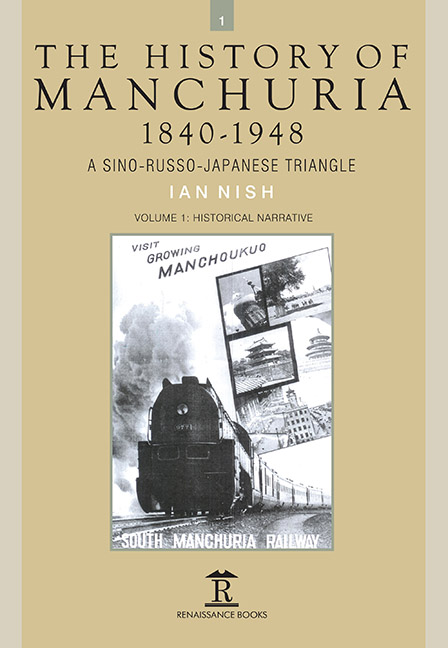Book contents
- Frontmatter
- Dedication
- Contents
- Preface
- Acknowledgements
- Name Conventions
- List of Abbreviations
- List of Maps
- Chapter One Manchuria and Russian Ambition, 1840s–1890s
- Chapter Two Sino-Japanese War and After, 1894–1900
- Chapter Three Prelude to the Russo-Japanese War, 1900–1905
- Chapter Four Railways, Reforms and Revolutions, 1906–1914
- Chapter Five Wartime Turmoil in Manchuria, 1915–1922
- Chapter Six Chang Tso-Lin’s Manchuria, 1922–28
- Chapter Seven Chinese Nationalism and Foreign Railways, 1929–1931
- Chapter Eight Lytton Commission in Manchuria, 1931–1932
- Chapter Nine Manchukuo: From Republic to Empire, 1933–1937
- Chapter Ten A Decade of Wars, 1938–1948
- Epilogue
- Map
- Select Bibliography
- Index
- Volume 2: Select Primary Sources
- Miscellaneous Frontmatter
- Dedication
- Miscellaneous Frontmatter
- Chapter 1 1840–1894
- Chapter 2 1895–1899
- Chapter 3 1900–1905
- Chapter 4 1905–1914
- Chapter 5 1915–1922
- Chapter 6 1922–1928
- Chapter 7 1929–1931
- Chapter 8 1931–1932
- Chapter 9 1933–1937
- Chapter 10 1938–1948
- Apendix Appeal by the Chinese Government
Chapter Two - Sino-Japanese War and After, 1894–1900
Published online by Cambridge University Press: 18 November 2023
- Frontmatter
- Dedication
- Contents
- Preface
- Acknowledgements
- Name Conventions
- List of Abbreviations
- List of Maps
- Chapter One Manchuria and Russian Ambition, 1840s–1890s
- Chapter Two Sino-Japanese War and After, 1894–1900
- Chapter Three Prelude to the Russo-Japanese War, 1900–1905
- Chapter Four Railways, Reforms and Revolutions, 1906–1914
- Chapter Five Wartime Turmoil in Manchuria, 1915–1922
- Chapter Six Chang Tso-Lin’s Manchuria, 1922–28
- Chapter Seven Chinese Nationalism and Foreign Railways, 1929–1931
- Chapter Eight Lytton Commission in Manchuria, 1931–1932
- Chapter Nine Manchukuo: From Republic to Empire, 1933–1937
- Chapter Ten A Decade of Wars, 1938–1948
- Epilogue
- Map
- Select Bibliography
- Index
- Volume 2: Select Primary Sources
- Miscellaneous Frontmatter
- Dedication
- Miscellaneous Frontmatter
- Chapter 1 1840–1894
- Chapter 2 1895–1899
- Chapter 3 1900–1905
- Chapter 4 1905–1914
- Chapter 5 1915–1922
- Chapter 6 1922–1928
- Chapter 7 1929–1931
- Chapter 8 1931–1932
- Chapter 9 1933–1937
- Chapter 10 1938–1948
- Apendix Appeal by the Chinese Government
Summary
FOR HALF-A-CENTURY AFTER 1894 ‘Manchuria’ was the plaything of the Powers. Her people were aware of this humiliation and from time to time showed their resistance by rebellion, protests and anti-foreign out-bursts. The provincial governors, the Taotai and their officials faced it as a daily problem but knew there was little they could do in view of the weak hand they played. The other force in society, commonly called warlords, who controlled their own fighting men were also opposed to foreign intrusions but they could occasionally be tempted to play along with the incomer. Nominally under the rule of the Manchu court, the Manchurians were not masters of their destiny and were reliant on Peking to negotiate settlements with outside barbarians on their behalf. Very often these settlements were made in the interest of the faction in power at court rather than by consultation with local leaders.
‘Manchuria’ was the battlefield for two wars in the decade after 1894. The first was between China and Japan which is the main subject of this chapter; the other which follows a similar pattern was between Russia and Japan and was on a scale which has tempted historians to call it World War Zero. Nonetheless, the significant fighting in both wars took place blatantly on Manchurian soil. Manchuria was the major sufferer in both wars but was not the cause of either war. Both were caused by international rivalries over influence in her strategic neighbour, Korea. Those who had power in Manchuria were too weak to limit the impact on their territory in either case. They had numbers but not military skills. George Montgomery, the experienced Commissioner of Customs at Newchwang (Nyuzhuang) is quoted as speculating that the Chinese army amounted to 50,000 men, 20,000 being Chinese and the balance ‘Manchurians’.
SINO-JAPANESE WAR OF 1894–5
The war was fought between two armies and navies, untested in warfare. Japan had a relatively small army, compact, highly disciplined and modernized. China had a big army. Japanese spoke of it as being of the order of 1 million men in the northeast, though Chinese estimates are around 140,000 – a great discrepancy.
- Type
- Chapter
- Information
- The History of Manchuria, 1840-1948A Sino-Russo-Japanese Triangle, pp. 21 - 38Publisher: Amsterdam University PressPrint publication year: 2016



